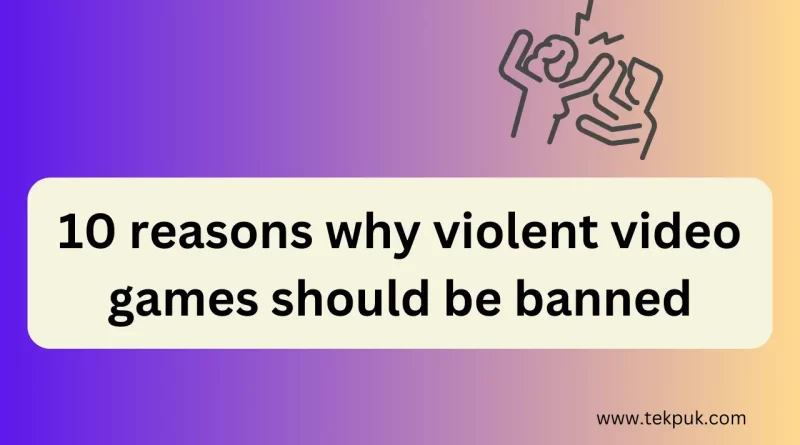10 reasons why violent video games should be banned
In a world dominated by technology, video games have become a ubiquitous form of entertainment. However, the debate over the impact of violent video games on individuals, particularly on the younger generation, has been a longstanding and contentious issue.
10 Reasons Why Violent Video Games Should Be Banned
Violent video games have become an integral part of modern entertainment, but the debate over their impact on society rages on. Here are ten compelling reasons why advocates call for the banning of such games.
Impact on Child Development
The first reason why violent video games should be banned revolves around their potential impact on child development. Young minds are impressionable, and exposure to violent content may hinder their emotional and cognitive growth.
Influence on Youth Behavior
The influence of violent video games on youth behavior is a topic that has garnered much attention. Parents and educators worry about the potential for games to shape attitudes, values, and actions among impressionable minds.
Violent video games can alter social dynamics, especially among the youth. The fourth reason explores how these games may impact interpersonal relationships, communication skills, and the ability to empathize.
Psychological Effects
It is essential to investigate the potential impact of violent video games on cognitive development, empathy, and emotional responses to understand the psychological effects of prolonged exposure fully.
Link to Aggressive Behavior
Studies consistently show a correlation between violent video games and increased aggression. The second reason emphasizes the link between exposure to violent gaming content and the development of aggressive behavior in players.
Desensitization to Violence
The third reason delves into the concept of desensitization. Prolonged exposure to violence in video games may desensitize individuals, making them less sensitive to real-world acts of aggression and brutality.
Psychological Well-being
Concerns about the psychological well-being of gamers form the fifth reason. The immersive nature of violent games can contribute to mental health issues, including anxiety and stress.
Safeguarding Youth
The sixth reason emphasizes the need to safeguard youth from potentially harmful content. Implementing a ban on violent video games seeks to protect the mental and emotional well-being of the younger generation.
Reducing Real-world Violence
Advocates for a ban argue that restricting violent video games can contribute to a decrease in real-world violence. The seventh reason explores how such a measure may create a safer society.
Promoting Positive Gaming Culture
The eighth reason focuses on fostering a positive gaming culture. By eliminating violent games, the industry can shift its focus toward promoting creativity, collaboration, and positive gameplay experiences.
Fostering Responsibility in Gaming Industry
Banning violent video games can catalyze the gaming industry into taking greater responsibility. The ninth reason highlights the importance of ethical game development and responsible content creation.
Case Studies
Examining real-life case studies where the impact of violent video games has been studied can provide valuable insights into the complexities of this issue. Understanding the context and outcomes of these studies is crucial for a comprehensive perspective.
Public Opinion
Considering the diverse opinions on this matter, analyzing public sentiment and the evolving discourse surrounding violent video games is essential. Public opinion often influences regulatory decisions and industry practices.
The Importance of Parental Guidance
Active parental involvement is paramount in addressing concerns related to violent video games. Establishing open communication, setting boundaries, and staying informed about the content of games can empower parents to guide their children responsibly.
You might find this interesting:
- How to make a gamepass on roblox laptop
- Top 10 Best Games on Jio Cloud Gaming
- How to see Liked Reels on Instagram
- Elevate Your Gaming Experience with the Jio Cloud Gaming Controller
Conclusion
In conclusion, the call for banning violent video games stems from a collective concern for the well-being of individuals and society at large. Balancing entertainment with impact, acknowledging collective responsibility, and shaping the future of gaming are critical steps towards a healthier gaming environment.
FAQs
Q1.Are all violent video games harmful?
Ans. While not all violent games have the same impact, studies suggest a potential link between exposure to violence in games and negative behavioral outcomes.
Q2.What age is appropriate for gaming?
Ans. Determining the right age for gaming varies for each child. It is crucial for parents to consider content ratings and monitor their child’s emotional response.
Q3. Do regulations infringe on freedom?
Ans. Regulations aim to balance freedom with responsible content consumption, protecting individuals, especially the youth, from potential harm.
Q4.Are there benefits to gaming?
Ans. Gaming can offer cognitive benefits, including improved problem-solving skills. However, it’s essential to choose age-appropriate and non-violent games.
Q5. How can parents monitor gaming content?
Ans. Parents can use parental controls, review game ratings, and engage in open communication with their children about the content they consume.
Q6. What alternatives exist to violent games?
Ans. Numerous non-violent and educational games cater to various age groups, offering engaging alternatives without the potential negative impact.




